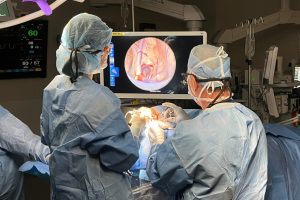Gregory D. Hager is the Mandell Bellmore Professor of Computer Science, with joint appointments in the departments of Electrical and Computer Engineering and Mechanical Engineering at the Whiting School, and the Department of Surgery at the School of Medicine. He is the founding director of the Johns Hopkins Malone Center for Engineering in Healthcare, an interdisciplinary research center aimed at developing innovative healthcare technology and systems and a member of the Data Science and AI Institute.
Hager is known for his research on collaborative and vision-based robotics, time-series analysis of image data, and medical applications of image analysis and robotics; he has published more than 500 articles and books on these topics. With his lab, the Computational Interaction and Robotics Lab, Hager studies problems that involve dynamic, spatial interaction at the intersection of imaging, robotics, and human-computer interaction. As a leader in the development of algorithms for real-time computer vision and their uses for robotics, his work has had real-world application in manufacturing and warehouse automation as well as driving research advances in automated surgical training, medical imaging and diagnostics, and computer-enhanced interventional medicine.
Hager’s many contributions to the field of vision-based robotics have earned him status as a Fellow of the Institute of Electrical and Electronics Engineers, the Medical Image Computing and Computer Assisted Intervention Society, the ACM, the American Institute for Medical and Biological Engineering, and the American Association for the Advancement of Science.
In 2014, Hager was awarded a Hans Fischer Fellowship at the Technical University of Munich’s Institute of Advanced Study, where he also holds an appointment in computer science. He served as the deputy director of the NSF Engineering Research Center for Computer-Integrated Surgical Systems and Technology and as chair of the Johns Hopkins Department of Computer Science from 2010 to 2015. In 2024, he was appointed as the head of the NSF’s Computer and Information Science and Engineering Directorate. Hager is also a co-founder of two startups: Clear Guide Medical, whose groundbreaking platform enables doctors and technicians to perform more accurate ultrasound-guided procedures, and Ready Robotics, dedicated to making industrial robots easier to use.
Hager has been a member of numerous prominent review committees and panels on artificial intelligence, including Stanford University’s 100 Year Study on Artificial Intelligence; a roundtable on AI and foreign policy held by the National Academies of Science, Engineering, and Medicine; and a panel at the 2018 American Association for the Advancement of Science annual meeting on “Artificial Intelligence: Augmenting Not Replacing People.” He also served as a board member of the Computing Research Association and co-chaired the 2015 review of the Networking and Information Technology Research and Development Program for the President’s Council of Advisors on Science and Technology. Hager is a member of the NSF’s Computer and Information Science and Engineering advisory committee and the governing board of the International Federation of Robotics Research and is chair emeritus of the Computing Community Consortium. He has served on the editorial boards of IEEE Transactions on Robotics, IEEE Transactions on Pattern Analysis and Machine Intelligence, and the International Journal of Computer Vision.
Hager received his BA in mathematics and computer science, summa cum laude, from Luther College (1983) and his MS (1986) and PhD (1988) from the University of Pennsylvania. He was a Fulbright Fellow at the University of Karlsruhe and was on the faculty of Yale University prior to joining Johns Hopkins in 1999.


